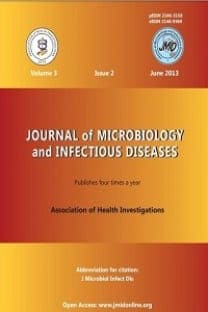Nuclear Matrix Protein 22 and Cytological Findings in Urine of Residents of Urogenital Schistosomiasis in an Endemic Community
___
- 1. World Health Organization. Schistosomiasis Number of People Treated Worldwide in 2013. Weekly Epidemiol Rec 2015; 5(90): 25-32. http://www.who.int/ schistosomiasis/en/ 2. World Health Organization. Schistosomiasis Fact Sheet: 2014 No.115. (http://www.who.int/medicentre/factsheets/fs115/enl) 3. Lokeshum VB, Habuchi T, Grossman HB. et al. Bladder tumor markers beyond Cytology: International Consensus Panel on Bladder Tumor Markers. Urology 2005; 66 (Supplement 6A): 35-63. 4. Lokeshwar VB, Obek C, Soloway MS. Tumor-associated hyaluronic acid: A new sensitive and specific urine marker for bladder cancer. Cancer Res 1997; 57:773-777. 5. Ejezi, GC, Uko EK, Braide E. Schistosomiasis in Cross River State, Nigeria. Prevalence and Intensity of Infection on Admin Akamkpa Local Government Area. J Hyg Epidemiol Microbiol Immunol 1991; 35:141-147. 6. Useh MF, Ejezie GC. Prevalence of Morbidity of Schistosoma Haematobium Infection in Adim Community of Nigeria. J Med Lab Sc 1996; 5:17-51. 7. Useh MF Ejezie GC. Modification on Behaviour and Attitude in the Control of Schistosomiasis. Observation in Water Contract Patterns and Perception of Infection. Annals Trop Med Hyg 1999; 93 (7): 711-720. 8. Inyang-Etoh PC, Ejezie GC, Useh MF, Inyang-Etoh EC. Efficacy of Artesunate in the Treatment of Urinary Schistosomiasis in an Endemic Community in Nigeria. Annals Trop Med Parasitol 2004; 98:491-499. 9. Inyang-Etoh PC, Ejezie GC, Useh MF and Inyang-Etoh EC. Efficacy of a combination of Praziquantel and Artesunate in the treatment of urinary Schistosomiasis in Nigeria. Transaction of the Roy Soc Trop Med & Hyg 2009; 103: 38-44. 10. Inyang-Etoh PC, Anyanwu CJ, Udonkang MI, Equali VI. Cytological Findings in Urine of Adult Residents of Urinary Schistosomiasis Endemic Community in Cross River State, Nigeria. British J Med Med Res 2015; 8(11): 948-955. 11. Adie HA, Okon OE, Arong GA. Braide EI, Ekpo UF. Spatial Distribution of Urinary Schistosomiasis in Cross River State, Nigeria Using Geographical Information System and School Based Questionnaire. Pakistan J Biol Sc 2013; 16:116-1172. 12. Chen MG, Mott KE. Progress in the assessment of morbidity due to Schistosoma haematobium infection. Trop Dis Bull 1989; 86: R1-R36. 13. Inyang-Etoh PC, Ejezie GC, Useh MF. Height as a surrogate for bodyweight for estimating the dosage of praziquantel and artesunate in the treatment of urinary schistosomiasis in school-age children. Mary Slessor J Med 2010; 10(1):29-37. 14. Ejezie GC, Udoh AE, Meremikwu MM, Odigwe GO, Useh, MF. Some effects of annual treatment and re-treatment on morbidity indicators of urinary schistosomiasis. Mary Slessor J Med 1998; 1: 67-72. 15. Arene FOI, Ukpeibo ET, Nwanze EA. Studies on schistosomiasis in the Nigeria Delta: Schistomiasis intercalatum in the urban city of Port Harcourt, Nigeria. Public Health 1989; 103: 295-301. 16. Okolie NJC. Prevalence and intensity of urinary schistosomiasis among the Abriba people of Abia State, South Easthern Nigeria, J Internal Sci Res 2008; 1(2): 156-159. 17. Anyanwu GI, Okoro KN. Observations on urinary schistosomiasis in school children in Jos, 27au State, Nigeria. International J Eviron Health Human Dev 2002; 3(1): 31-34. 18. Nwabueze AA & Opara OE. Outbreak of urinary schistosomiasis among school children in riverine communities of Delta state, Nigeria; impact of road and bridge construction. J Med Sc 2007; 7:572-578. 19. Roberts LS & Janovy JJ.Gerald D. Schmidt, Roberts L.S. Foundations of Parasitology. 8th ed. Boston: McGraw Hill Educational Foundation. 2009; 147-170. 20. Kumar A, Kumar R, Gupta NP. Comparison of NMP22 BladderChek Test and Urine Cytology for the Detection of Recurrent Bladder Cancer, Japan J Clinical Oncol 2006; 36(3): 172-175. 21. Barbieri CE, Cha EK, Chromecki TF, et al. Decision curve analysis assessing the clinical benefit of NMP22 in the detection of bladder cancer: Secondary analysis of a prospective trial. BJU Internal 2012; 109(5): 685-690. 22. Lokeshwar VB, Cerwinka WH, Lokeshwar BL. HYAL, Hyaluronidase: A Molecular Determinant of Bladder Tumour Growth and Invasion. Cancer Res 2005; 65:2243. 23. Botelho ME, Machado JC, Da Costa, JMC. Schistosoma haematobium and bladder cancer. Virulence 2009; 1(2):84-87. 24. Wu XR. Urothelial tumorigenesis: a tale of divergent pathways. Nat Rev Can 2005; 5: 713-725. 25. Sullivan PS, Chan JB, Levin MR, Rao J. Amer J Trans Res 2010; 2(4): 412-440. 26. Lokeshwar VB, Robinwicz D, Schroeder, GL, et al. Stromal and epithelial expression of tumour markers hyaluronic acid and HYAL1 Hyaluronidase in prostate cancer. J Biol Chem 2001; 276(15):11922.
- ISSN: 2146-3158
- Başlangıç: 2011
- Yayıncı: Sağlık Araştırmaları Derneği
Ahmed OLOWO-OKERE, Yke IBRAHİM, M. BABANDİNA, Bo OLAYİNKA
Abirami Lakshmy Jayachandran, Radhika Katragadda, Thyagarajan Ravinder, Leela Vajravelu, Lavanya Manorajan, S. Hemalatha, Kaliappan Shanmugam
Sunil Vilasrao GİTTE, Chaitanya NİGAM, Ashish B. CHAKRABORTY, Krishnamurty KAMBLE, Mukesh SONİ, Rupam GAHLOT
Bibek Ranjan SHOME, Krithiga NATESAN, Susweta Das MİTRA, Nimita VENUGOPAL, Bhuvana MANİ, Feroze GANAİE, Rajeswari SHOME, Habibur RAHMAN
Ukeme Gideon ETUK, Paul Columba INYANG-ETOH, Mfonisa İniobong UDONKANG, Emmanuel Monday Japhet, Uloma Opara-Osuoha
Jorge R. MOSQUEİRA, Sue ANİCAMA, Jorge DE LOS RÍOS
Cecile Okalla EBONGUE, Roane Nkodo MENGUE, Jean-pierre Nda MEFO’O, Elvis TEMFACK, Emmanuel Roddy MENGUE, Dieudonne ADİOGO
